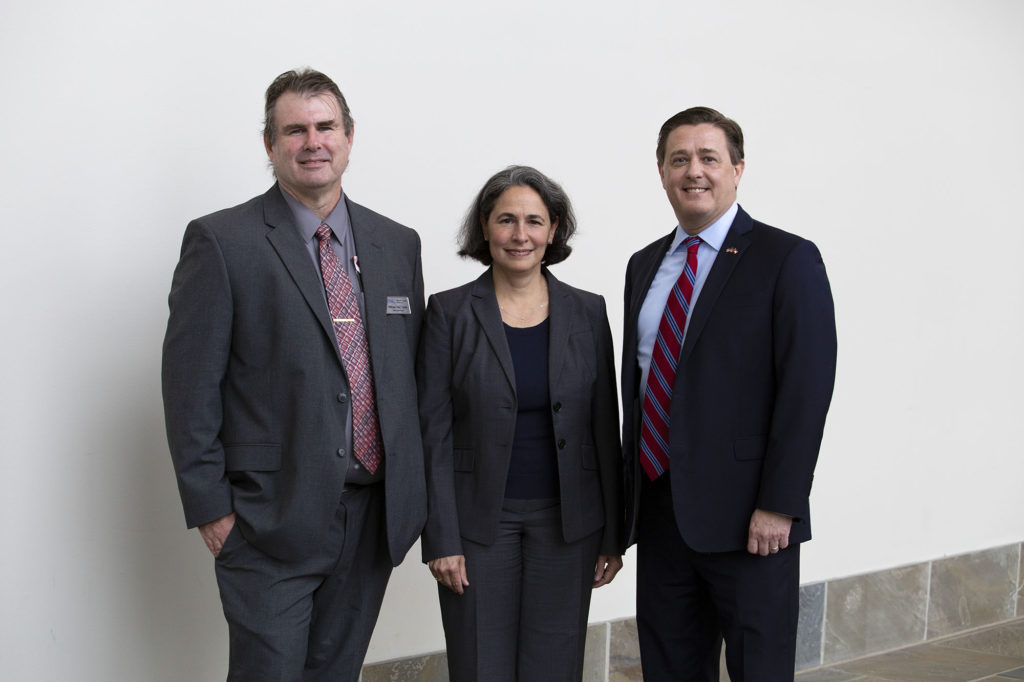
More than 350 business, government and community leaders from the west Georgia region convened at the University of West Georgia Tuesday morning to hear three speakers’ vision for 2020 at the 23rd annual Economic Forecast Breakfast.
Dr. William “Joey” Smith, chair of UWG’s Department of Economics, was the first of three speakers during the breakfast, hosted by the Center for Business and Economic Research (CBER), a research center in the Richards College of Business.
Also speaking during the event – which brought together people from Carroll, Coweta, Douglas, Haralson, Paulding and Polk counties – were Mark Butler, Georgia commissioner of labor, and Maria Karahalis, an equity investment director at Capital Group.
Dr. Micheal Crafton, UWG’s interim president, welcomed stakeholders from the six-county region to the event.
“Here at UWG, we know it’s one thing to make an economic impact on our community – which we do, at a record $605 million last year,” Crafton said. “But it’s not enough to just make that impact, though. Not only must we do things, but we have to spend a lot of time understanding things. We do a good job of that at UWG, especially in the Department of Economics. That understanding and wisdom are what we’re here to learn from today.”
Dr. Faye McIntyre, dean of the Richards College of Business and Sewell Chair of Private Enterprise, called the Department of Economics one of the best of the nation, adding that it has been a “tremendous asset” to the university and its community.
“This is always one of my favorite events because it shows the Richards College of Business is interested in staying in touch with our business partners so we can provide the services you need and ensure our students are learning the concepts and skills they’ll need once they graduate and become part of the workforce,” McIntyre said.
In his regional update, Smith reported that employment and wages are both increasing, with unemployment rates (3.5 percent) and initial unemployment claims (down 7.4 percent over last year) at or near historic lows.
“What we’re seeing now is some bouncing along the bottom, which is likely to happen when the rates are this low – they can only go so low, such that there’s really nowhere for them to go but up,” Smith said. “Our health care sector remains incredibly strong in west Georgia, and Paulding, Carroll and Coweta counties have led job development with 1,202, 1,017, and 772 new jobs each, respectively, this year.”
There are some areas of concern, though, Smith shared. Job growth in the automotive sector are slowing as U.S. sales fall back to long-term trends and labor strikes and tariffs bring uncertainty to the industry.
“Additionally, we have a long-term supply shortage of affordable housing for our workforce,” Smith said. “There’s a lack of housing that will attract new workers to our region, and that may adversely affect the quality of our labor pool. Young, qualified workers are ready to buy, but there’s not much in their price range.”
As labor commissioner, Butler is responsible for monitoring the economic environment of the state, fostering mutually beneficial relationships with Georgia’s employers and economic developers, and designing policies and programs that put Georgians to work.
While employment and the available workforce has grown over the past year, the growth hasn’t been comparable to the previous few years, which saw incredible growth in those two areas. One area, though – jobs available – has skyrocketed this year, adding 77,400 over the past year.
“Georgia has done a great job at creating jobs, but the workforce shortage is just tremendous, so we don’t have the workers to take the jobs,” Butler said. “This isn’t just a Georgia problem, though. States nationwide are having this problem.”
Butler credited a fair share of the problem to a lack of soft skills in available employees, mentioning that his office has created GeorgiaBest.com, an educational tool that teaches the importance of skills like punctuality, dependability and conflict resolution.
Butler implored attendees to make a long-term effect on the workforce by employing hard-to-reach populations.
“We’re seeing an astronomical lack of workers for the jobs we’re trying to fill,” Butler said. “Now is the time to reach those hard to reach populations who are more marginal and young people who are trying to get their first job. As a community, those are the areas we really need to focus on getting employed right now.”
Karahalis, who has more than three decades of experience in the investment industry, said she was struck by how similar everything she heard from Smith and Butler mirrors what’s happening across the rest of the country.
“For the past few years, it seems we’ve been in a virtual cycle of recovery since the financial crisis, and there’s nothing to suggest that the 3.5 percent unemployment rate is going to get worse any time soon,” Karahalis said.
As for the stock markets, Karahalis said U.S. markets have done well in a period where, broadly speaking, international markets have not done so well.
“That’s leading some people to conclude that there’s no use investing internationally, but I think that may be a little shortsighted,” she said. “There are still plenty of great opportunities for investment growth outside our country’s borders, and I believe we will be seeing a lot of that growth over the next year.”
Smith described the Economic Forecast Breakfast as giving attendees a “snapshot in time” of what’s happening in the world around them economically, while also giving them a bit of direction as to where the economy may be headed in the next few months to couple of years.
“When everyone walks away from our breakfast every year, I hope they have the information they need to make good decisions about their businesses if they’re business owners, about policy if they’re elected officials or about their daily lives if they’re average citizens,” he said. “We want everyone to be as well-prepared as they can for whatever comes.”

